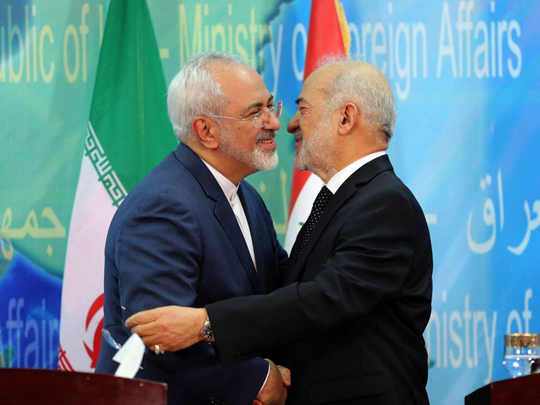
Dubai: Tehran is seeking to play the role of “policeman of the region”, and this weekend’s regional tour of Iranian foreign minister Mohammad Zarif sends a message to the regional countries, analysts said.
But the analysts differ on the content of the message. Some say it is to calm the fears of the region after the Iranian nuclear agreement. Others believe Iran is attempting to further deepen the differences in the positions of the different Arab Gulf countries, which has built relations with Tehran at different levels of strength, and they say that Zarif visited countries which had good relations with his country and excluded others which did not.
“I believe his [Zarif’s] tour has a negative aspect, which is deepening the divisions in the positions of the Arab Gulf countries” towards Iran, Doha-based political scientist Mahjoub Zweiri told Gulf News.
“He [Zarif] knows very well the political weight of Riyadh and by not visiting Riyadh he aims to further heighten the differences in the views of the Arab Gulf countries” in dealing with Tehran, added Zweiri, who has wrote and co-authored several books on Iran.
However, other analysts gave a different interpretation of Zarif’s Gulf tour to Kuwait, Qatar and Iraq — all of them enjoy good relations with Iran. They outweigh the possibility that some countries didn’t “reciprocate the Iranian overtures”.
Barbara Slavin, senior Fellow at Atlantic Council, a Washington-based think tank in the field of international affairs, believes Zarif sought to calm regional anxiety and fears triggered by the nuclear agreement between Iran and the western powers earlier this month.
“Zarif is seeking to calm these fears and present Iran as a key part of any solution to local crises, not just part of the problem. Whether he can convince anyone remains to be seen,” Slavin told Gulf News. She expressed doubt that Iran will become “more aggressive in the region” after the nuclear agreement.
Already many Arab countries, including in the Gulf region, accuse Iran of interfering in their internal affairs and attempting to flex its muscles with growing influence in Iraq, Lebanon, Syria and Yemen.
Iran is “boasting that it will become the policeman of the region”, said Saudi political analyst Waheed Hamzah Hashem.
“It is obvious that Iran is preparing this role especially as none of the Arab countries are capable of proving their unity, solidarity steadfastness to play such a role,” he told Gulf News.
Hamzah said that Egypt is bogged down with internal and external threats and issues, Saudi is leading a war in Yemen, Iraq is fragmented, and Daesh is playing freely in both Iraq and Syria and sending its members to carry out explosions in different parts of the Arab region.
Earlier, Saudi foreign minister Adel Al Jubair criticised Iranian “aggressive” comments in the region during a joint press conference with EU foreign policy chief Federica Mogherini in Saudi Arabia on Monday.
The European official is heading to Tehran which will also receive the French foreign minister later this week.
However, the Iranian nuclear agreement won’t add much to Iranian influence in the region, some analysts said.
“Iran has created chaos in the region since 2003 without a nuclear agreement,” Zweiri said. “Iran can’t make more chaos. Instead it will focus more on the situation in Syria”, where some estimates put the Iranian aid to the regime of Bashar Al Assad between $8 and $10 billion dollars in a span of two years, ending at the beginning of 2014.
Even the impact of the nuclear agreement on the economic situation in Iran was exaggerated, according to Zweiri.
“Twenty per cent of Iran’s economic problems are because of the economic sanctions. But 80 per cent are related to the economic structure, including taxes, incentives, investments and regulations,” he added.












